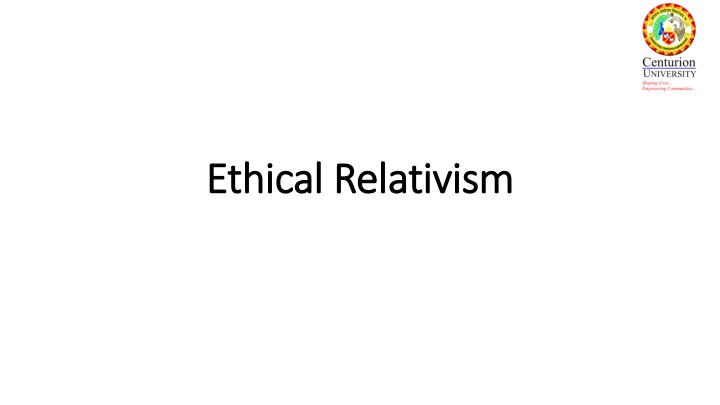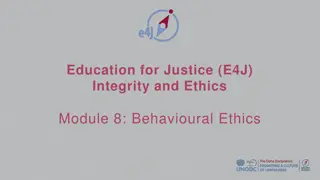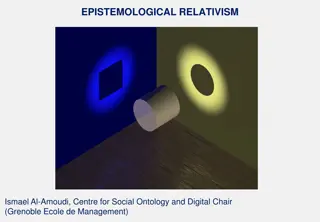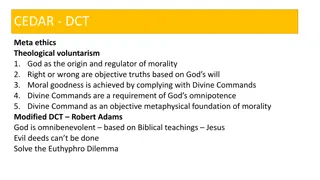
Ethical Relativism
Explore the concept of Ethical Relativism, which argues that moral values are not objective but relative to individuals or societies. Learn about different versions, reasons supporting this view, and the implications it has on understanding diverse moral beliefs and cultural influences.
Download Presentation

Please find below an Image/Link to download the presentation.
The content on the website is provided AS IS for your information and personal use only. It may not be sold, licensed, or shared on other websites without obtaining consent from the author. If you encounter any issues during the download, it is possible that the publisher has removed the file from their server.
You are allowed to download the files provided on this website for personal or commercial use, subject to the condition that they are used lawfully. All files are the property of their respective owners.
The content on the website is provided AS IS for your information and personal use only. It may not be sold, licensed, or shared on other websites without obtaining consent from the author.
E N D
Presentation Transcript
Ethical Relativism Ethical Relativism
Focus of Discussion Focus of Discussion Meaning of Ethical Relativism Versions Reasons/Arguments for Ethical Relativism Implications 23-04-2025 2
Ethical Relativism Ethical Relativism Ethical relativism is the view that moral (or normative) statements are not objectively true but true relative to a particular individual or society that happens to hold the belief Whenever two people or two societies disagree about the morality of an act (i.e. hold different and opposing views), both sides may be equally correct For example: anthropologists point to a range of practices considered morally acceptable in some societies but condemned in others, including infanticide, abortion, polygamy, racism, sexism, etc 23-04-2025 3
Versions of Ethical Relativism Versions of Ethical Relativism Individual or Personal Ethical Relativism Ethical statements are relative to individual I have my ethical views and you have yours, neither my views nor your views are better or more correct. For example, the existence of God or life after death Social or Cultural Ethical Relativism Ethical statements are relative to a given society What is right or wrong, one must simply look to the norms of the society in which they live. For example, abortion/contraception in Catholic tradition 23-04-2025 4
Reasons for ethical relativism I may not know something for certain, what is right in a given situation (traditional medicine) We may all hold different beliefs (belief in many Gods and one God) Our belief may be related to the situation (stealing, lying, etc) Tolerance in consistence with ethical relativism (degree of force in self-defense). 23-04-2025 5
Implications Implications Ethical relativism reminds us that different societies have different moral beliefs and that our beliefs are deeply influenced by culture. It also encourages us to explore the reasons underlying beliefs that differ from our own, while challenging us to examine our reasons for the beliefs and values we hold. 23-04-2025 6
Thank You Thank You 23-04-2025 7






















